TRAI is a two-year master’s program, taught entirely in English and designed for highly qualified and internationally oriented students. The program offers high-level scientific courses taught by professors from École Polytechnique and partner companies. The originality of the program is to emphasise not only the technical advances and cases, but also to highlight the practical and social limitations of modern AI, the implications of such limitations, and how to mitigate such issues. A main objective is to enable students to create AI applications which are not only effective, ground-breaking and forward thinking, but also trustworthy, transparent, and responsible. As well as advancing their knowledge of the theoretical fundamentals, students will also gain practical experience in securing AI workflows and harnessing AI to create solutions within a framework that emphasizes sustainability and responsibility. Some specific topics are listed as follows: |
- Sustainable AI: Focus on frugal, energy-efficient models, low-cost training, and optimized architectures. This includes parameter optimization, meta-learning, and AutoML, along with hardware and energy consumption considerations. Key areas also include feature selection, data representation, cloud computing, and infrastructure optimization.
- Trustworthy and Secure AI: Emphasizes privacy, safety, anomaly detection, robustness against adversarial attacks, and trust through model verification. It also addresses compliance with regulations and governance frameworks. We also look at evaluating the broader impacts of AI on business, society, regulation, and governance.
- AI Transparency and Explainability: Focuses on managing uncertainty, leveraging knowledge graphs, decision trees, optimization techniques, and mathematical programming to enhance interpretability.
● Ideally, candidates should hold a double bachelor’s degree in mathematics and computer science.
● Alternatively, a Bachelor’s degree in either field is acceptable, provided the applicant has a solid background in the other field. Mathematical background should include Statistics, Linear Algebra, & Analysis courses. Computer science background should consist of at least one Algorithmics, Data structures, and Programming course.
● Applicants with other degrees may also be considered, if they have a solid skill set in the abovementioned subjects.
● To enter directly in the M2, applicants should hold a master’s degree or a master 1 level (bachelor with 240 ECTS or more) in Applied math, including machine learning, algorithmic and visual computing courses, or in Computer science, including a strong background in visual computing, math, and machine learning.


Trustworthy and Explainable AI equips graduates with specialized skills that are increasingly valuable in industries where AI’s reliability and transparency are crucial. Graduates can take on one of an increasing number of roles in organizations that prioritize ethical and interpretable AI, contributing to responsible innovation across healthcare, security, ecological transition, technology, energy, transport, finance, and beyond.
In these sectors, employers seek professionals for future jobs who can develop and audit AI systems to ensure they are fair, accountable, sustainable, and compliant with regulations. A sizable number of our students will successfully pursue a doctorate, often in the form of CIFRE theses in companies – after the master's program.


